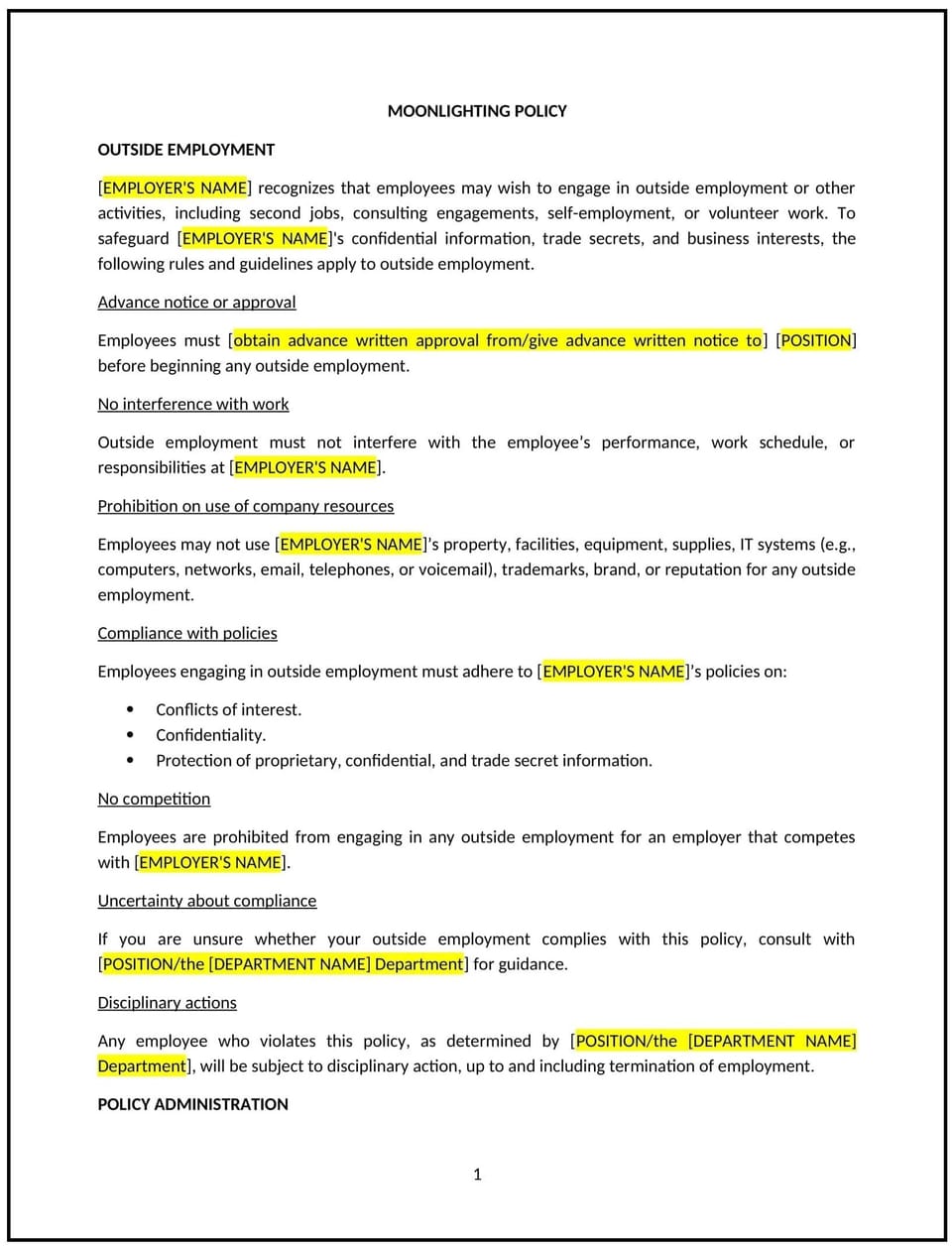Moonlighting policy (Louisiana): Free template

Moonlighting policy (Louisiana)
This moonlighting policy is designed to help Louisiana businesses provide guidelines for employees engaging in secondary employment outside their primary job. It outlines expectations to ensure that outside work does not conflict with job performance, create conflicts of interest, or negatively impact the business.
By implementing this policy, businesses can address potential concerns while promoting transparency and fairness.
How to use this moonlighting policy (Louisiana)
- Define moonlighting: Clearly specify what constitutes moonlighting, such as any paid or unpaid work outside the employee’s primary job.
- Set disclosure requirements: Require employees to inform their manager or HR about any secondary employment, including the nature of the work.
- Address conflicts of interest: Specify situations where outside work may create conflicts, such as working for competitors or in roles that interfere with job responsibilities.
- Include performance expectations: Emphasize that secondary employment must not impact the employee’s productivity, availability, or quality of work.
- Outline approval processes: Provide steps for seeking approval for moonlighting activities, if required by the business.
- Detail consequences: Specify potential outcomes for employees who fail to adhere to the policy, such as corrective action or termination.
Benefits of using a moonlighting policy (Louisiana)
Implementing this policy provides several advantages for Louisiana businesses:
- Promotes transparency: Encourages open communication about secondary employment.
- Protects company interests: Reduces risks of conflicts of interest or divided loyalties.
- Maintains productivity: Ensures employees remain focused on their primary job responsibilities.
- Establishes fairness: Applies consistent standards for all employees regarding moonlighting.
- Reflects Louisiana-specific practices: Considers local workforce dynamics and business culture.
Tips for using this moonlighting policy (Louisiana)
- Communicate clearly: Ensure employees understand the policy during onboarding and through regular reminders.
- Encourage disclosure: Create a supportive environment where employees feel comfortable reporting secondary employment.
- Monitor performance: Regularly assess whether outside work is affecting employee productivity or job responsibilities.
- Provide case-by-case evaluation: Review each moonlighting situation individually to assess potential impacts on the business.
- Update regularly: Revise the policy to reflect changes in workplace needs or Louisiana-specific considerations.
Q: What is considered moonlighting under this policy?
A: Moonlighting refers to any paid or unpaid work outside the employee’s primary job, including freelance work, part-time roles, or consulting.
Q: Do employees need approval for secondary employment?
A: Employees may need to seek prior approval, especially if the work could create a conflict of interest or impact their primary job performance.
Q: How should employees disclose their moonlighting activities?
A: Employees should inform their manager or HR about the nature of the outside work and any potential overlap with their primary job.
Q: Can employees work for competitors under this policy?
A: Working for competitors is typically prohibited to avoid conflicts of interest and protect company information.
Q: What happens if moonlighting affects an employee’s job performance?
A: If performance issues arise, the business may address them through corrective action, up to and including termination, as outlined in the policy.
Q: How often should this policy be reviewed?
A: The policy should be reviewed annually or when workplace dynamics or Louisiana-specific considerations evolve.
Q: What steps can businesses take to enforce this policy fairly?
A: Businesses can ensure fairness by applying the policy consistently, documenting all disclosures, and providing employees with clear expectations.
This article contains general legal information and does not contain legal advice. Cobrief is not a law firm or a substitute for an attorney or law firm. The law is complex and changes often. For legal advice, please ask a lawyer.


